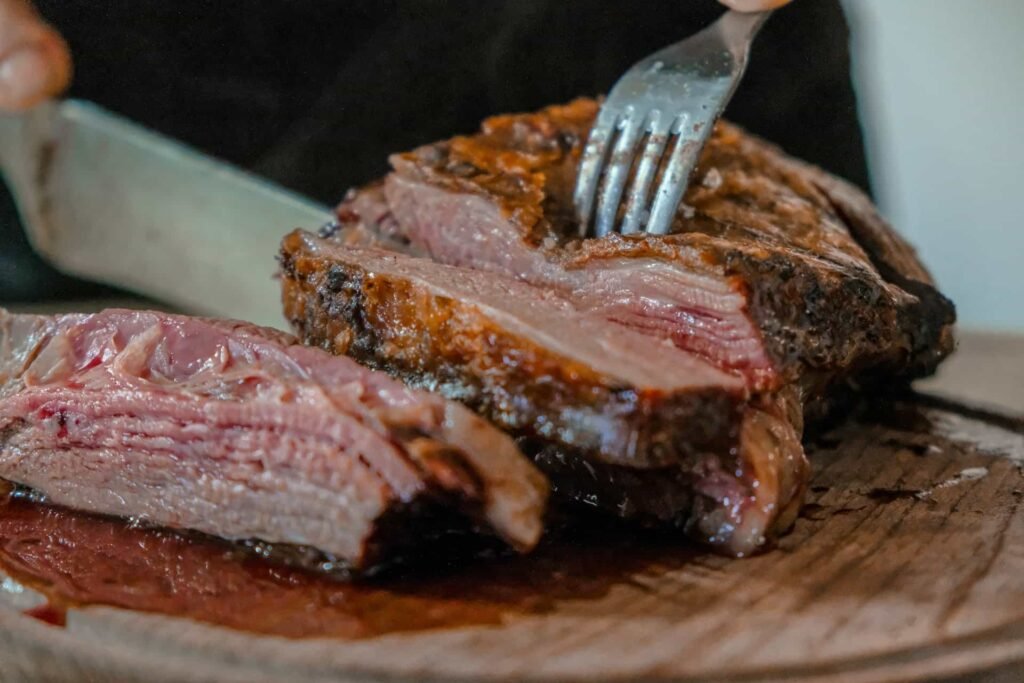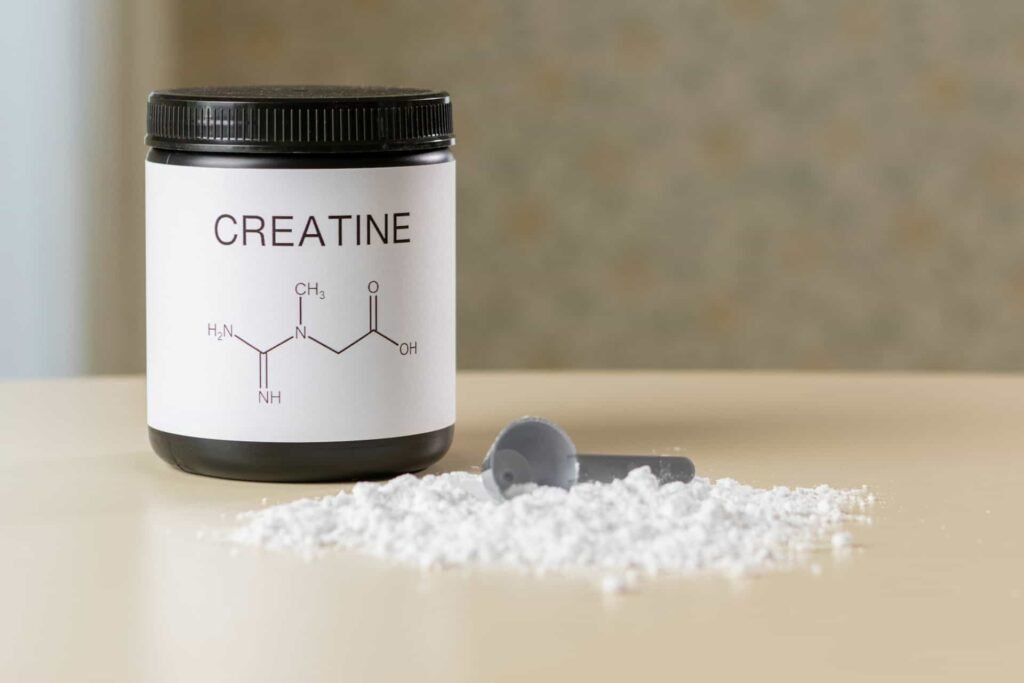Creatine, which is chemically known as Alpha Methyl Guanidine-Acetic Acid, is an amino acid. Three kinds of amino acids form creatine. Creatine is produced naturally in our body. It is mostly produced in the liver, and a small amount is produced in our kidneys and pancreas.
Except for the internal source, we can also get creatine from red meat, eggs, and fish. Creatine is found mostly in meat from animal sources; a very small amount is found in the organs. I needed to clear the doubt, as many people think organs contain most of the creatine, but it is the opposite.
Creatine can also be lab-produced and given as supplements. In the market, you can see different kinds of creatine supplements produced in the labs. When we consume creatine, the majority is stored in our muscle cells. Many studies have found that we store almost 95% of the creatine in our muscles.
Contents
If we can get creatine from foods, why must we consume supplements?
It is a very common question, and I struggled to find the correct answer when I was in a dilemma about purchasing creatine supplements. As I was new to fitness and did not know much about supplementation, I struggled to find the answer.
However, as I now have the correct answer, I will not let you suffer and break down why people use creatine supplements when they can get them from food. To clarify things, make sure that there is no difference between the creatine we get from food and lab-produced creatine. The reasons for using supplementations are:
- You need to eat a lot of meat to get the same amount of creatine from food. Approximately 450 grams of Tuna or Red meat contains 1 or 2 grams of creatine, whereas if you take it as a supplement, one scoop will provide you with 3 to 5 grams of creatine. So, if you want to get creatine from foods, then you need to eat a lot, which will increase your daily calories.
- When we cook food, a significant amount of creatine is degraded. It is assumed that approximately 30% of creatine is degraded from food sources when we cook them.
Consuming creatine from foods is no problem, but excessive red meat is not very good for us. To avoid that problem, creatine supplements are the best option, providing creatine without side effects.
Creatine supplements are usually a great option for vegetarians. They are not exposed to creatine from their diet because they do not consume meat products. Initially, it can work very well for vegetarians.

Benefits of Creatine
There are a lot of benefits of creatine. It is very good for our cells. It is one of the most researched sports supplements on the market. The main benefits of creatine are:
- Creatine saves our cells from damage. It saves our cells from different kinds of toxins.
- It increases sports performance. In almost every kind of sport, athletes benefit from consuming creatine. I am not making this up; multiple studies in different kinds of sports show that consuming creatine improves their performance to some extent.
- Creatine reduces wrinkle formation, which is really good for our skin. Many skin products contain creatine.
- Some researchers found out that creatine improves brain function. That is, you will see creatine is also recommended for aged people.
- It boosts the immune system, which helps our body in many ways.
Which is the best form of creatine?
In the market, you will find different kinds of creatine. Creatine Monohydrate is the basic form of creatine. Except that you will find:
- Creatine Citrate
- Creatine HCL
- Creatine Nitrate
- Creatine Magnesium Chelate
- Kre Alkalyn Creatine and many more
Many studies have compared which type of creatine is best. You will be amazed to know that all studies found Creatine Monohydrate to be superior. All other forms have been compared with Creatine Monohydrate, and it has been found that all the other forms are either equivalent or less effective than Creatine Monohydrate.
So do not fall for different brands’ marketing gimmicks claiming their creatine is superior. To date, no form of creatine has been found to be superior to Creatine Monohydrate.
Myths About Creatine
As I mentioned earlier, creatine is the most researched sports supplement. Though it has all the research to prove its point in different aspects, there are still different myths that surround it. There are endless myths about creatine, but I am going to discuss and break down the top five most popular myths.
Creatine Makes You Look Fat
Creatine does not make you fat. Creatine does not have any relation with gaining extra weight.
This myth originated because creatine holds water in our bodies, making us look bulky or fat. It is totally a misconception. Creatine holds water in your muscle cells; thus, it makes us look buff, not fat. If you look fat, it is not because of creatine; it is because you are fat.
The water retention of creatine does not increase our belly size nor gets held on fat cells; thus, it has no relation to making us look fat.
You need to drink a lot of water if you consume creatine
One of the most misleading statements is that as creatine holds water, you need to drink a lot or an immense amount of water; otherwise, you will be dehydrated, and your muscles will cramp. The sad part is that different coaches or influencers promote that.
Studies related to it have already debunked the myth. Many studies have been done on athletes performing high-endurance sports in hot environments, including marathons and triathlons. They have found that nothing happened to them even after taking creatine and drinking a regular amount of water.
It is a myth made of imagination without any scientific basis. You should drink the required amount of water for your body based on where you live and your individual needs.
Creatine Damages Your Kidney
To understand this myth, you must know that creatine and creatinine are two different things. Creatinine is the by-product or waste product of creatine that gets excreted out of our body through urine. Whereas creatine is a natural compound that, by now, you already know that our body can produce by itself.
If you take creatine supplementation or eat a lot of good meat, your creatinine level will typically go up. This is an indicator that your kidneys are working perfectly, excreting the excess waste product generated.
Much research has been done over a long time on the effects of creatine usage on the kidney, and it has been found that creatine does not damage the kidney.
You need to do creatine loading to get the most benefit
The creatine loading phase is when you consume a high amount of creatine for some time so that the creatine gets saturated in the muscle if you have not taken creatine previously.
It is not false, but it is unnecessary. If you consume 3 to 5 grams of creatine daily, the creatine will get saturated anyway after two or three. There is no additional benefit to creating a loading phase. You will run out of creatine faster, and brands will be able to sell more creatine.
Also, there is no specific time that boosts creatine absorption. You can take creatine any time, but I like to take it pre- or post-workout.
The average dose of creatine is 3 to 5 grams. You do not need to consume any more than that, as it will have no additional benefit. The extra creatine will get excreted from the body anyway.
Creatine Causes Hair Loss
It is the most controversial topic related to creatine. Of many studies, only one shows that creatine causes hair loss. Other studies did not find any relationship between hair loss and taking creatine.
This myth became popular because creatine increases testosterone and dihydrotestosterone (DHT) levels. DHT is thought to cause hair loss, and that is why many hair products include anti-DHT ingredients. However, creatine does not elevate DHT to a level that will cause hair loss. Thus, most studies deny the claim that creatine causes hair loss.

